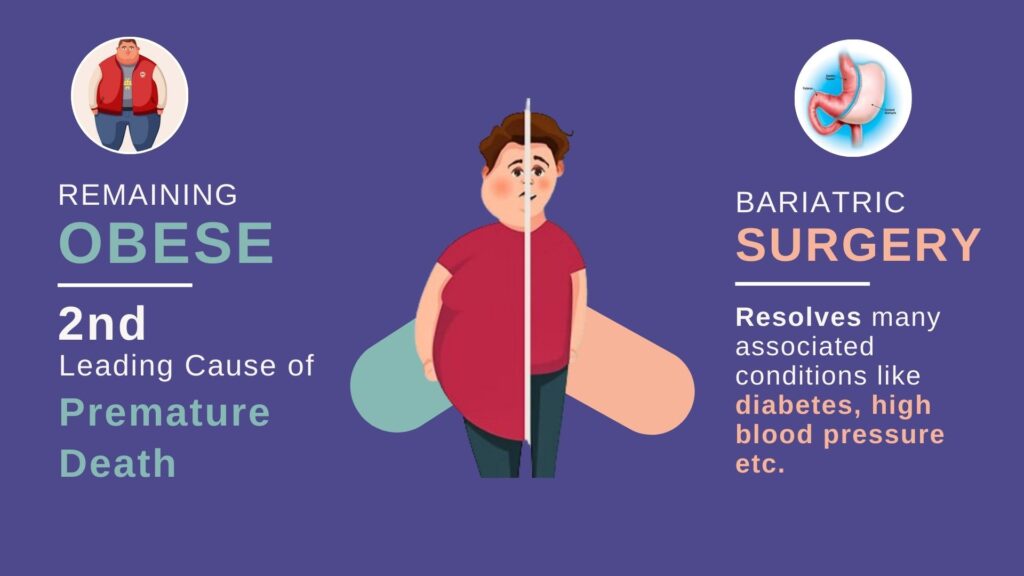
Amisha Bhayani
Bariatric Dietician & Content Writer
Are You Struggling With Obesity and Unhealthy Lipid Levels? Here's a Solution For You

Obesity is associated with a range of health issues, particularly affecting how the body handles fats and cholesterol. Multiple studies highlight the link between obesity and dyslipidemia, a condition characterized by high triglycerides and LDL (“bad” cholesterol) levels, along with low levels of HDL (“good” cholesterol). These lipid problems significantly increase the risk of cardiovascular diseases like heart disease, high blood pressure, and diabetes in obese individuals.
Research suggests that around 60-70% of obese people experience dyslipidemia, highlighting how common these lipid metabolism issues are in this population. Important indicators of dyslipidemia in obesity include elevated levels of serum triglycerides, VLDL (“bad” cholesterol), apolipoprotein B, and non-HDL-C. These findings underscore the importance of addressing lipid abnormalities as part of a comprehensive approach to managing obesity-related health complications.
Health Risks Associated with High Cholesterol
Elevated lipid levels, such as cholesterol and triglycerides, can have various adverse effects on health, including:
Atherosclerosis: Increased lipids can lead to the accumulation of plaque in the arteries, a condition known as atherosclerosis. This buildup narrows the arteries, impeding blood flow and raising the risk of heart attack and stroke.
Coronary Artery Disease (CAD): CAD develops when plaque buildup restricts blood flow to the heart muscle. Elevated lipid levels significantly contribute to the development of CAD.
Heart Attack: Rupture of plaque in the coronary arteries can form a blood clot, obstructing blood flow to a section of the heart and causing a heart attack.
Stroke: Similarly, a blood clot blocking an artery supplying blood to the brain can result in a stroke.
Peripheral Artery Disease (PAD): PAD occurs when plaque buildup narrows arteries in the limbs, commonly the legs, leading to pain, numbness, and reduced circulation in the affected limbs.
Pancreatitis: Excessively high triglyceride levels can trigger inflammation of the pancreas, a condition known as pancreatitis.
Xanthomas and Xanthelasmia: Yellowish fat deposits can accumulate under the skin, typically around the eyes (xanthelasma) or on the joints and tendons (xanthomas).
Gallstones: Elevated cholesterol levels can contribute to the formation of gallstones, which may cause pain and complications if they obstruct the bile ducts.
Managing both lipid levels and obesity is crucial for overall health.
Bariatric surgery is a surgical procedure designed for individuals who are severely overweight or obese. Its primary aim is to aid weight loss by altering the digestive system. This is typically achieved by either reducing the size of the stomach or bypassing a portion of the small intestine, thereby limiting food intake and absorption. Bariatric surgery is often considered as a last resort for those who haven’t been successful in losing weight through traditional methods such as diet and exercise, and who face serious health risks due to their weight.
The surgery can result in significant and sustained weight loss, along with improvements in obesity-related health conditions like type 2 diabetes, high blood pressure, and sleep apnea.
The relationship between bariatric surgery and lipid levels is noteworthy.
Bariatric surgery can significantly influence lipid levels in individuals undergoing the procedure. Lipids, such as cholesterol and triglycerides, are fats present in the bloodstream, whose excessive levels can contribute to heart disease and other health issues.
Research indicates that bariatric surgery often results in positive changes to lipid profiles. This includes decreases in total cholesterol, LDL cholesterol (commonly known as “bad” cholesterol), and triglycerides, alongside increases in HDL cholesterol (referred to as “good” cholesterol). The rapid weight loss post-surgery can trigger alterations in metabolism and fat distribution, which can have a beneficial impact on lipid levels. Moreover, modifications in gut hormones and the gut microbiome may also contribute to enhancing lipid metabolism.
In summary, bariatric surgery not only aids in weight loss but also enhances various aspects of metabolic health, including lipid levels.






